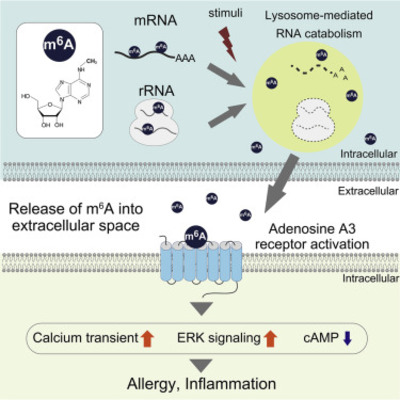PRESS RELEASE
- Research
- 2021
N6-methyladenosine (m6A) is an endogenous A3 adenosine receptor ligand
Authors
Akiko Ogawa, Chisae Nagiri, Wataru Shihoya, Asuka Inoue, Kouki Kawakami, Suzune Hiratsuka, Junken Aoki, Yasuhiro Ito, Takeo Suzuki, Tsutomu Suzuki, Toshihiro Inoue, Osamu Nureki, Hidenobu Tanihara, Kazuhito Tomizawa, Fan-Yan Wei
Abstract
About 150 post-transcriptional RNA modifications have been identified in all kingdoms of life. During RNA catabolism, most modified nucleosides are resistant to degradation and are released into the extracellular space. In this study, we explored the physiological role of these extracellular modified nucleosides and found that N6-methyladenosine (m6A), widely recognized as an epigenetic mark in RNA, acts as a ligand for the human adenosine A3 receptor, for which it has greater affinity than unmodified adenosine. We used structural modeling to define the amino acids required for specific binding of m6A to the human A3 receptor. We also demonstrated that m6A was dynamically released in response to cytotoxic stimuli and facilitated type I allergy in vivo. Our findings implicate m6A as a signaling molecule capable of activating G protein-coupled receptors (GPCRs) and triggering pathophysiological responses, a previously unreported property of RNA modifications.
Molecular Cell : https://www.cell.com/molecular-cell/fulltext/S1097-2765(20)30959-X

